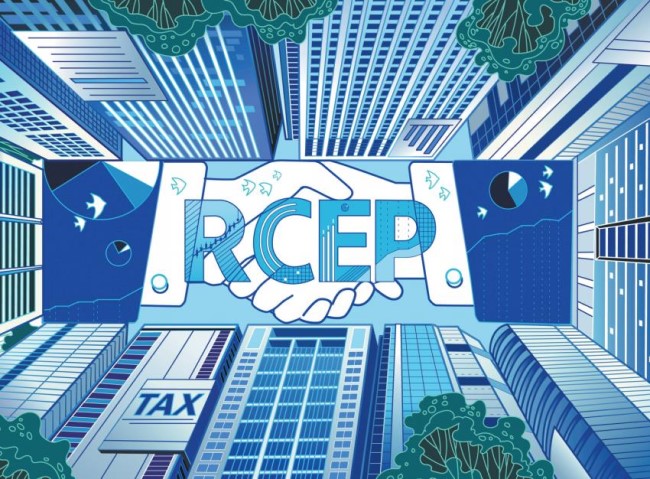World's largest free trade deal boosts confidence of enterprises

[PHOTO BY SHI YU/CHINA DAILY]
BEIJING -- Soon after midnight on New Year's Day, a freight train departed from South China's Guangxi Zhuang autonomous region for Vietnam, a member country of the Regional Comprehensive Economic Partnership (RCEP).
The RCEP -- the world's largest free trade deal -- came into force on Saturday.
The X9101 train carried electronics, daily necessities and chemical products worth more than $10 million. It is expected to reach Hanoi in 28 hours after leaving Nanning, the regional capital of Guangxi.
Also on early Saturday, 5.6 tonnes of imported reflective films from Japan arrived at a port in South China's Shenzhen city, which will be used for the production of mobiles, digital cameras and other electronic products.
The implementation of the RCEP agreement has helped lower the cost of customs duties by 6,000 yuan (about $940) for the films worth 1.33 million yuan, said Chen Guogang, a director from a Shenzhen-based supply chain service provider called Jiuli.
The RCEP was signed on Nov 15, 2020, by 15 Asia-Pacific countries -- 10 members of the Association of Southeast Asian Nations (ASEAN) and China, Japan, the Republic of Korea (ROK), Australia and New Zealand -- after eight years of negotiations that started in 2012.
With optimized trade rules among signatories, streamlined procedures and wider opening-up in the sectors of services trade and investment, it will bring tangible benefits to companies of member countries.
"The company and overseas partners both benefit a lot from following the trend of regional economic integration in East Asia, and I believe the RCEP will further promote this process," said Li Dongchun, a manager of Guangxi Liugong Machinery Co., Ltd., a machinery manufacturer based in the city of Liuzhou in Guangxi.
Despite the COVID-19 pandemic, the first 11 months of 2021 saw the company's exports up by 70 percent year on year to reach 15,000 units, of which 3,000 units were sold to ASEAN countries, said Li.
In central China's Hunan Province, customs authorities issued RCEP certificates of origin to companies including Zhuzhou Cemented Carbide Works Imp.& Expo. Co. on Saturday.
"With the RCEP in effect, tariffs will be gradually reduced to zero. We will further expand our overseas market," said Li Yuhong, a manager of the company that exports products to ASEAN countries, Japan and the ROK.
Experts said that under the RCEP, a higher level of opening up, a larger market and better policies will bring more new development opportunities and potential, which will inject sustained momentum into the post-pandemic recovery of the global economy.

